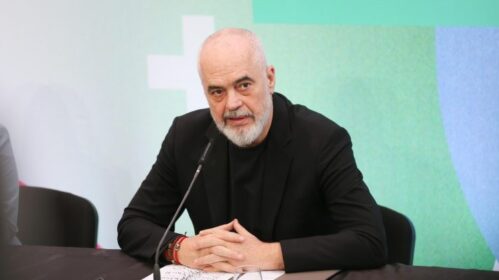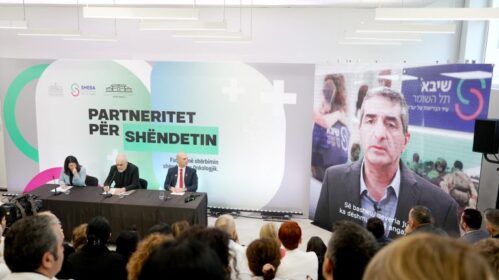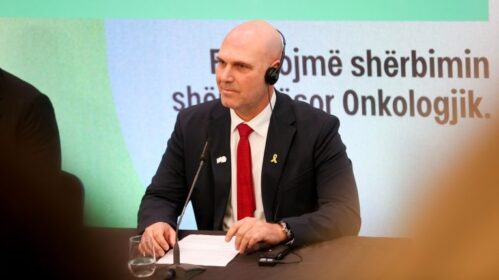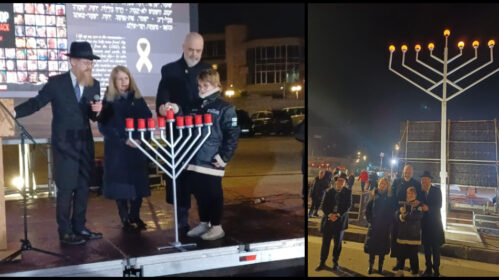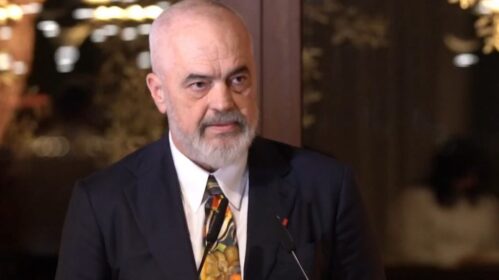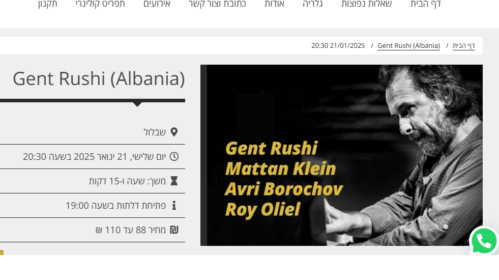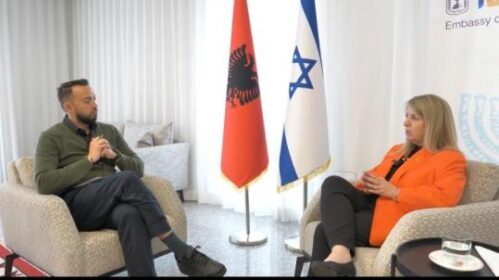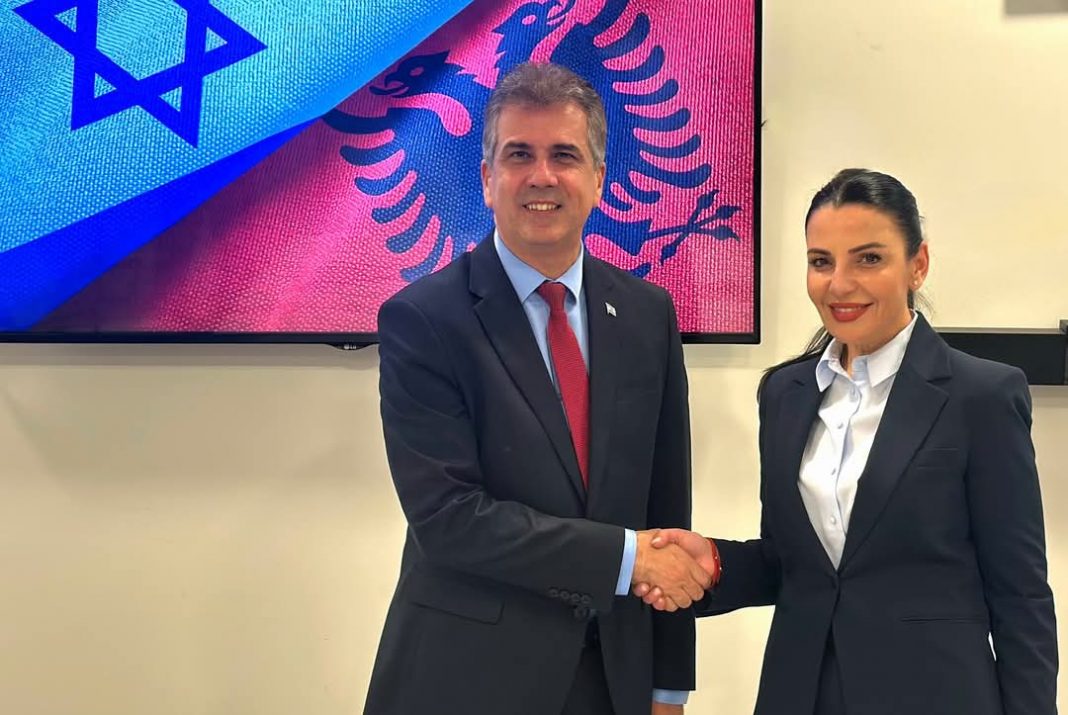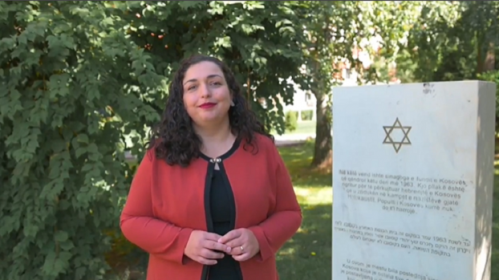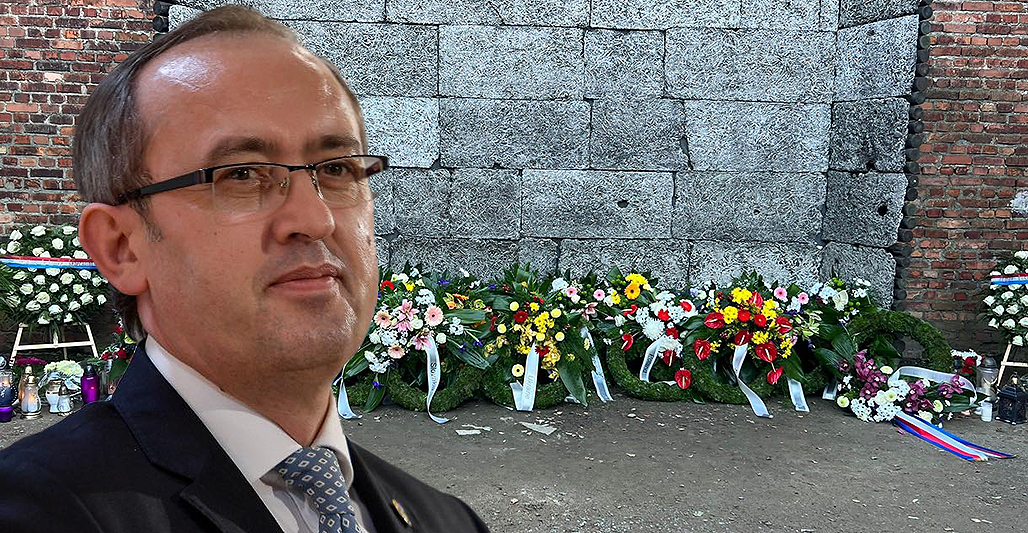Shirley Cloyes DioGuardi
Very few people know about the long history of Albanian religious tolerance and resistance to oppression. Neither do they know that during World War II, all Jews who lived in Albania or sought asylum in that country were saved from the ravages of the Holocaust. This information was suppressed by the Stalinist Communist regime of Enver Hoxha who controlled Albania for fifty years.
When European Jewry began fleeing to Albania to escape the unfolding events in Western Europe in the early 1930s, there were approximately 200 Jews living in Albania. (Archaeological evidence documents the presence of Jews in Albanian lands since the epoch of Roman rule.) At the end of World War II, there were close to 2,000 Jews living in Albania—the only nation that can claim that every Jew within its borders was rescued from the Holocaust.
One witness to the lack of anti-Semitism in Albania was Herman Bernstein, himself a Jew, who served as U.S. Ambassador to Albania from 1930 to 1933. Bernstein wrote in his letters that:
There is no trace of any discrimination against Jews in Albania because Albania
happens to be one of the rare lands in Europe today where religious prejudice and
hate do not exist, even though Albanians themselves are divided into three faiths….”[1]
THE fact that Albanians had been isolated from centuries of institutionalized anti-Semitism in Western Europe was a factor in this remarkable record. However, the principal reason for Albanians saving Jews was their history of religious tolerance based on the Kanun and its underlying moral code of besa.
In the words of Mehmet Hysref Frasheri, a descendant of one of the most influential families in the political history of Albania who rescued Jews from the Nazi Holocaust, “People in Albania are not surprised; they thought that it was normal to save Jews.” His statement is echoed by Beqir Qoqja, a 93-year-old who today lives in the same house as he did when his family sheltered Avraham Eliasaf, aka Avram Gani, from 1943 to 1944. “I have always been a devout Muslim,” Qoqja told fine art photographer Norman in a 2004 interview. “We did nothing special; all Hebrews are our brothers and sisters.”
Muslim and Christian Albanians not only risked their lives to save Jews, but no incident has been found where they accepted compensation. When Avram Gani offered to recompense Beqir Qoqja for sheltering him, Qoqja refused, telling him that “Albanians give besa to a friend, but never sell it.”
Although the Kanun contains an oft-publicized, abhorrent, but now archaic set of injunctions for carrying out blood-feuds, it is primarily a collection of Albanian customary laws that covers and regulates all aspects of conduct within one’s family, village, and clan, with members of other clans, and with complete strangers. The Kanun has been the foundation of Albanian society over centuries and, as Professor Leonard Fox has written in his superb introduction to his 1989 English translation of the Kanun, it is an “expression and reflection of the Albanian character.” [2]
BESA, which inextricably links personal honor and respect for and equality with others, is the foundation of the Kanun. Besa has multiple meanings, ranging from faith, inviolable trust, truce, and word of honor to a sacred promise and obligation to keep one’s word to provide hospitality and protection. It involves uncompromising protection of a guest, even to the point of forfeiting one’s own life.
For example, Book 8, Chapter 18, of the Kanun, which deals with “social honor,” opens with the maxim that “the house of an Albanian belongs to God and to the guest.” It continues by stating that, “A weary guest must be received and surrounded with honor. The feet of a guest are washed.” “Every guest must be given the food eaten in the house.” And, upon the entering the house, the guest “must give you his weapon to hold as a sign of guardianship, since after you have said, ‘Welcome,’ he must have no fear and know that you are ready to defend him against any danger.” The Kanun “demands that a guest should be accompanied…lest he be the victim of some wicked act.” “If someone mocks your guest or abuses him, you must defend your guest’s honor, even if your own life is in danger.”
THE modern Western concept of “foreigner” does not exist in the Kanun, only the concept of the guest.[3] Hence, there were no Jewish “foreigners” in Albania during World War II—only Jewish “guests,” who had to be sheltered and protected even at the risk of Albanian lives.
The story of Ali Alia, the owner of a general store in Puka, illustrates dramatically the extent to which Albanians went to save Jewish lives. In 1943, a German transport carrying 19 Albanian prisoners on their way to hard labor and one Jew who was to be shot, stopped outside Alia’s store. Sizing up the situation, Alia, who spoke excellent German, invited the Nazis into his store, offered them food, and plied them with wine until they were drunk.
While they were drinking, Alia convinced the Nazis that he should give the prisoners
some food. He handed the young Jewish prisoner a piece of melon. In it, Alia had concealed a note instructing him to flee into the woods and to wait for him at a designated place. When the Nazis got ready to leave Alia’s establishment, they discovered that the Jewish prisoner was missing and erupted in fury. They dragged Ali Alia into the village square and pinned him against a wall. Four times the Germans put a gun to his head, but he continued to maintain his innocence.
Abruptly they left to search for the Jewish prisoner. When they returned empty-handed, they threatened to burn the village down if Alia did not confess. He did not, and finally the Germans left Puka for good. Alia retrieved the Jewish prisoner, whose name was Yeoshua Baruchowitz, and hid him in his home for two years until the war was over. (Today he is a dentist living in Mexico.)[4]
ALBANIANS are generally recognized as the oldest inhabitants of Southeast Europe. They are the descendants of the Illyrians, the core pre-Hellenic population that extended as far as Greece and Italy. During the six centuries that the Romans ruled Illyria, the Illyrians resisted assimilation, retained their legal norms, and their culture and language—both of which are distinctly different from their neighbors in Southeast Europe. Today’s Illyrians are Albanians who use the Roman alphabet; their neighbors are Slavs who use the Cyrillic alphabet. Albanians are Muslims, Catholics, and Orthodox Christians who have lived side by side in harmony for centuries.
The Kanun has been central to Albanian survival in the face of hundreds of years of occupation and genocide. As such, it is a form of collective memory, cultural identity, and resistance. Some of the customs described in the Kanun are believed to have originated in antiquity. They were transmitted orally and handed down from generation to generation, with input from a variety of authors. Ultimately, the text of the Kanun (the word that gives us the English “canon”) was attributed to Leke Dukagjini, an Albanian prince who lived from 1410 to 1481. Educated in his native Shkodra, Albania, and Venice, Italy, Dukagjini emerged as a leader in the Albanian resistance to the Ottoman Turks, who invaded the Balkan Peninsula in the second half of the fourteenth century. Dukagjini was a contemporary and sometime compatriot of Gjergj Kastrioti
“Skenderbeg”—the Albanian national hero and towering 15th century figure who fought
against the Ottomans for 25 years and prevented them from overtaking Western Europe.
Although Dukagjini continued the fight against Ottoman domination for a decade after Skenderbeg died of disease in 1468, he became best known for codifying the set of laws that came to be called the Kanun.
The late Albanian linguist Martin Camaj has stated that the “natural form of this unwritten law remained rooted in the spirit and memory of an ancient people forever in contact and conflict with the customs and laws of other peoples.” “The maxims of the Kanun,” he said, “were primary; they took precedence over all other laws.”[5] This was illustrated dramatically during the 500 years in which Albanians resisted Ottoman Turkish occupation, from the 15th to the early 20th centuries. According to Syrja Pupovci in his introduction to the 1972 reprint of the Kanun, the preservation of the Kanun “was one of the most important elements in helping the Albanian people to maintain their individuality under Turkish domination.”[6]
WHEN the Ottomans invaded Albanian lands, Albanian society had a well-defined clan system and all Albanians were Christians—either Eastern Orthodox or Catholic. The Ottomans set out to destroy the clans through forced conversion to Islam and acceptance of Islamic law. Although mass conversions to Islam occurred in the 17th century, when Ottoman officials levied discriminatory taxes against non-Muslims, the Ottomans never succeeded in destroying either the Albanian clan system or the power of the Kanun. Conversion to Islam was nominal. Until today, intermarriage between Muslims and Christians is commonplace, and religion is rarely the basis of conflict, because religion is secondary to Albanian identity—individually and collectively. According to the Kanun, there is no “distinction between man and man. Soul for soul, all are equal before God.”
THE individual who would ultimately codify the Kanun in writing was a Franciscan priest born in Kosova in 1874 named Shtjefen Gjecov. Gjevoc was an ardent Albanian nationalist who participated in the 1912 uprising against the Turks, which began after a group of Albanian leaders declared Albanian independence in Prizren (in what is now Kosova) on November 28, 1912. No sooner did Albanians throw off 500 years of Turkish domination, than they found themselves battling Slavic incursion, beginning with the Balkan Wars of 1912-1913, in which half a million Albanians were killed or died of hunger and disease, followed by racism, forced assimilation, expulsion, occupation, and genocide at the hands of hostile Slavic regimes that would last in various forms until today.
That story is the subject of a separate article from this one. What is important to note
here is the fact that, after the Balkan Wars, Albanians were unfairly and artificially divided. With the assent of the socalled Great Powers (Austria-Hungary, Britain, France, Germany, Italy, and Russia), Serbia annexed half of Albanian lands, including Kosova, and other parts were given to Montenegro and Greece. Only because of the intervention of then-U.S. President Woodrow Wilson was the State of Albania created in 1918.
In 1939, when Mussolini’s Italian fascist forces invaded and occupied Albania, the country had been a monarchy since 1925. The Italians were followed in 1943 by the German Nazis, who remained until they were defeated by the Allied forces a year later.
Early on, according to Apostol Kotani, the leading authority on the history of Jews in Albania and cochair with Dr. Petrit Zorba of the Albanian-Israeli Friendship Society, Albanians hid and protected Jews on their own initiative and in an uncoordinated way. Later, as it became more dangerous under the Germans, the rescue operation became more organized and “national liberation councils” in towns and village where Jews were hiding moved Jews from place to place—either with false passports or disguised as Albanian peasants. Albanian officials passed some anti-Jewish regulations, but only to placate the Italians and the Germans; they never enforced them. When the Germans asked Albanian leaders to provide a list of Jews living in Albania in 1943, they refused.[7] As American Jewish philanthropist Harvey Sarner has observed in his Rescue in Albania, “the importance of Albania as a sanctuary is demonstrated by the fact that only 10 percent of the 70,000 Jews who were in the surrounding territory of Yugoslavia survived the Holocaust.” That being said, many Albanians just outside of Albania’s current borders under Nazi occupation in Kosova, Macedonia, and Montenegro hid Jews and provided them with false documents and safe transport into Albania.
IN the 50 years from World War II to the fall of the Berlin Wall, the history, culture, and reality of Albanians was either concealed or misrepresented by their oppressors. In Albania, Communist dictator Enver Hoxha subjected the country to 46 years of one of the most centralized and repressive totalitarian regimes that the world has ever known. Hundreds of thousands of Albanians were murdered and imprisoned until Hoxha died and the regime of his successor, Ramiz Alia, collapsed in 1991. Meanwhile, the Albanians living outside of Albania in what is now the former Yugoslavia were subject to anti-Albanian and repression under Marshal Tito.
Most of the Jews in Albania immigrated to Israel, as a result of the courageous efforts of Josef Jakoel and his daughter, Felicita, leading up to the fall of communism in 1991. (Josef, who was born in the historical community of Jews in Vlora that dates back to the sixteenth century, had been saved with his sister by an Albanian Muslim named Shyqyri Myrto.)
BUT we might never have known the extent of Albanian efforts to save Jews during the Holocaust if it were not for the trip made to Albania in 1990 by Congressman Tom Lantos, a Holocaust survivor from Hungary, and former Congressman Joe DioGuardi, as the first U.S. officials to enter the country in 50 years. Seeking to ingratiate himself with Congressman Lantos, dictator Ramiz Alia presented never-before-seen archives containing letters, photographs, and newspaper clippings about Albanians who saved Jews during World War II. DioGuardi subsequently sent the files to Israel, where they were authenticated by Yad Vashem. In 1995, with the help of Congressman Lantos and former Congressman Ben Gilman, the Albanian American Foundation worked with the U.S. Memorial Holocaust Museum in Washington, DC, to add Albania (previously overlooked) to the “Righteous among Nations” section of the museum.
TODAY, three and a half million Albanians live in the State of Albania and another three and a half million live side by side on its borders—in Kosova, Macedonia, Montenegro, the Presheva Valley (southern Serbia), and Chameria (northern Greece), while yet another eight million live in the diaspora, primarily in the United States, Western Europe, Turkey, and Australia—having fled Slavic state-sponsored terrorism and later Communism within and outside of the State of Albania.
Although millions were imprisoned, tortured, and killed in the post-war era, Communist and Slavic efforts to suppress or destroy Albanian customs and the major precepts of the Kanun failed. What has continually allowed Albanians to define themselves after a history of being defined by their subjugators is the powerful ethical underpinning of the Kanun. It also is what made Albanians take on the unique role of saving all Jews from the Holocaust, and powerfully illustrates the intimate interconnection between besa and religious tolerance that has been endemic to Albanians.
In the 21st century, Albanians must begin to overcome the destructive psychosocial consequences of hundreds of years of occupation, racism, and genocide. At the same time, their story is not only one of subjugation but—as epitomized by their courageous behavior during the Holocaust—it is also one of resistance to oppression, religious tolerance, and a commitment to justice.
Shirley Cloyes DioGuardi is the Executive Director of the Albanian American Foundation, the Balkan Affairs Adviser to the Albanian American Civic League, and a political analyst who has testified at several hearings on Southeast Europe before the House International Relations Committee. For more information, visit the website of the Albanian American Civic League and Foundation at www.aacl.com.
This article was published in the January/February 2006 issue of Congress Monthly, the magazine of the American Jewish Congress (New York, New York).






